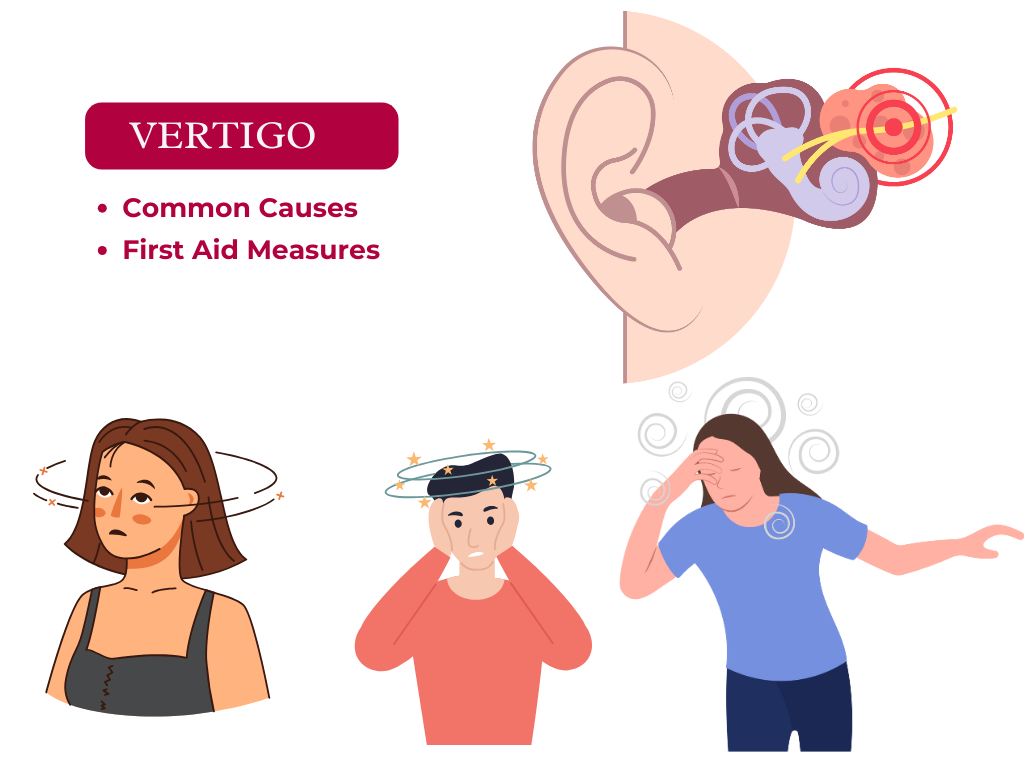Vertigo is a type of dizziness characterized by a false sense of spinning or movement of the environment around you. It’s a sensation that can be intense and debilitating, making it difficult to maintain balance, walk, or even stand.
Vertigo can be a terrifying experience. There are several possible reasons for vertigo, and I’ll outline some common causes. Please note that it’s essential to consult a healthcare professional for a proper diagnosis and treatment.
Common Causes of Vertigo
Benign Paroxysmal Positional Vertigo (BPPV): Small crystals in the inner ear become dislodged, causing brief but intense episodes of vertigo.
Labyrinthitis: An inner ear infection that can cause vertigo, hearing loss, and tinnitus.
Vestibular Neuritis: Inflammation of the vestibular nerve, which can cause vertigo, nausea, and vomiting.
Meniere’s Disease: A disorder of the inner ear that can cause vertigo, tinnitus, hearing loss, and ear fullness.
Head or Neck Injury: Head or Neck Injury: Trauma to the head or neck can cause vertigo.
Migraines: Some people experience vertigo as a symptom of migraines.
Inner Ear Problems: Other inner ear issues, such as otosclerosis or acoustic neuroma, can cause vertigo.
Sudden sensorineural hearing loss from noise – induced, sickle cell crisis etc.
Degenerative disease of the cervical spine or cervical spondylosis (Cervical vertigo)
First Aid Measures for Vertigo
If you're experiencing vertigo, follow these steps:
-
Sit or lie down
Immediately sit or lie down to prevent falls and injuries.
-
Stay calm
Try to remain calm and still, as movement can exacerbate vertigo.
-
Focus on a fixed point
Look at a fixed point in front of you to help stabilize your vision.
-
Avoid sudden movements
Sudden movements can worsen vertigo, so try to move slowly and deliberately.
-
Stay hydrated
Drink water to stay hydrated and help your body recover.
-
Seek support
If you're experiencing severe vertigo, ask someone to stay with you and provide support.
-
Avoid
Driving, swimming, climbing heights like stair case without assistance.
-
Be careful
Of being in the kitchen alone to cook without any assistance to avoid any accidents.
When to Seek Medical Attention
If you're experiencing vertigo, seek medical attention:
-
Severe vertigo
If your vertigo is severe, lasts for an extended period, or is accompanied by other symptoms like headache, fever, or weakness.
-
Hearing loss
If you experience hearing loss, tinnitus, or ear fullness.
-
Double vision
If you experience double vision, blurred vision, or eye movements.
-
Weakness or numbness
If you experience weakness, numbness, or tingling in your face, arms, or legs.
-
Difficulty speaking
If you experience difficulty speaking, swallowing, or breathing.
Remember, if you’re unsure about the cause of your vertigo or if it persists, consult a healthcare professional for proper evaluation and treatment.
Share Post On:
Recent Posts
-
Nuggets of ORL-OTOLOGY
-
Nuggets of ORL-RHINOLOGY
-
Nuggets of Otorhinolaryngology-Basic sciences
-
Anatomy of the Muscles of the Soft Palate
-
Ethmoidal Arteries Ligation for Epistaxis
-
Submucous Cleft Palate (SMCP)
-
Approach to Ligation of the External Carotid Artery
-
Approach to Managing a 3-Year-Old Boy with a Foreign Body in the nasal cavity.
-
Approach to Managing a 3-Year-Old Boy with a Foreign Body impacted in the ear canal.
-
Endoscopic Sphenopalatine Artery Ligation (ESPAL) for Epistaxis
-
Surgical Management of Epistaxis
-
Technique of Incision and Drainage of Septal Hematoma/Septal Abscess
-
Upper Aerodigestive Tract Foreign Body Impaction
-
Incision and Drainage of Hematoma Auris
-
Rigid Bronchoscopy for Retrieval of Foreign Bodies in Children
-
Foreign Body Impaction in the Larynx, Trachea, and Bronchi
-
Leadership Position is a Tool, not a Trophy
Categories
RELATED POSTS
Get in Touch
Read doctor-produced health and medical information written for you to make informed decisions about your health concerns.


